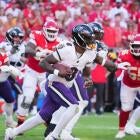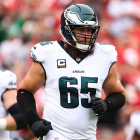Agent's Take: How much will the Colts' Quenton Nelson raise the bar for offensive guard salaries?
It wouldn't be surprising for the perennial first-team All-Pro to massively reset the market at the position

Signing offensive guard Quenton Nelson to a contract extension is a priority for the Colts. According to ESPN's Jeremy Fowler, the Colts would like to have a deal done before the end of the preseason.
Nelson declined to answer any questions about his contract during a media session last week. Absent a new deal, Nelson is scheduled to play the 2022 season under his $13.754 million fifth-year option.
Nelson, the sixth-overall pick in the 2018 NFL Draft, becoming the NFL's highest-paid interior offensive lineman is a foregone conclusion. That distinction currently belongs to Brandon Scherff, who signed a three-year, $49.5 million deal averaging $16.5 million per year with the Jaguars in this year's free agency. Scherff's deal is worth as much as $52.5 million through incentives.
Nelson probably has his sights set a lot a higher than Scherff's deal. It wouldn't be surprising if Nelson was looking to massively reset the offensive guard market, which might explain the hold up with a new contract.
Nelson earned first-team All-Pro honors from the Associated Press in each of his first NFL three seasons. He became only the fifth player in the past 50 years to accomplish this feat in 2020, joining Hall of Fame running backs Earl Campbell and Barry Sanders, Lawrence Taylor, who redefined the outside linebacker position, and tight end Keith Jackson. Nelson's first team All-Pro streak came to end last season as he dealt with back issues and an ankle injury. Nonetheless, Nelson was named to his fourth straight Pro Bowl.
Colts owner Jim Irsay holds Nelson in high regard. "Quenton, he is a generation player that -- I'm sorry, I see (John) Hannah and I see him of the last hundred years. I mean that's how good Quenton is," said Irsay last year. Hannah is considered by many to be the best offensive guard to ever play in the NFL.
Comments like this are music to an agent's ears. I used to love to it when teams made statements about clients, like Irsay's, while I was an agent. I kept a file with extremely favorable comments to use at contract time. It was my equivalent of an unwritten or unspoken Miranda rule. As far as I was concerned, teams had the right to remain silent. Anything overly positive said would be used against them in negotiations.
That's likely been the case in Nelson's negotiation, where an argument that a "generational player" deserves generational pay may have been made. Generational pay wouldn't mean barely supplanting right tackle Braden Smith as the Colts' highest-paid offensive lineman. Smith signed a four-year extension averaging $17.5 million per year at the start of training camp last year. It might mean Nelson becoming the league's first $20 million per year interior offensive lineman.
The $20 million per year offensive lineman club consists of only three members, all left tackles. The Texans made Laremy Tunsil the first to hit the mark on a three-year, $66 million extension during the 2020 offseason. David Bakhtiari raised the bar during the middle of the 2020 season with a four-year, $92 million extension averaging $23 million per year. Trent Williams technically became the NFL's highest-paid offensive lineman when the 49ers re-signed him in free agency last year to a six-year, $138.06 million contract averaging $23.01 million per year. Considering Williams will be 37 when scheduled to make $33.06 million in 2026, he realistically has a five-year, $105 million deal, at best, averaging $21 million per year.
Nelson becoming the league's fourth-highest-paid offensive lineman wouldn't be unprecedented for an offensive guard. Zack Martin's six-year, $84 million extension with the Cowboys in 2018 averaging $14 million per year put him second in the offensive lineman salary hierarchy when signed. By the end of the year, Martin had dropped to the fourth highest paid. The same year, Andrew Norwell's five-year, $66.5 million deal with the Jaguars during free agency that averaged $13.3 million per year, which was subsequently eclipsed by Martin, made him the league's second highest paid offensive lineman at signing. Norwell was fifth on the offensive lineman pay scale by the end of the season. The five-year, $58.5 million contract ($11.7 million per year) Kelechi Osemele received from the Raiders as a free agent in 2016 made him the league's third-highest-paid offensive lineman when signed.
Nelson is probably destined for a franchise tag in 2023 if an agreement with the Colts can't be reached. The non-exclusive franchise tag for offensive linemen next year projects to 8.149% of the 2023 salary cap, which should put the number in the $18.25 million neighborhood. A second franchise tag in 2024 with a NFL Collective Bargaining Agreement mandated 20% raise would be approximately $22 million.
Nelson would be justified in seeking to join the $20-million-per-year offensive lineman club based on potentially playing the franchise tag game. The average of two franchise tags should be slightly over $20 million per year. Nelson could maintain that he's only asking for the Colts to put him in the traditional place the highest-paid offensive guard has been in the offensive lineman salary hierarchy with his deal.
Scherff made $33.066 million the last two seasons for an average of $16.533 million per year playing on franchise tags with the Commanders. The average yearly salary in Scherff's Jaguars contract approximates his franchise tag average.
A pathway to a deal could still exist with the Colts balking at $20 million per year. Nelson can make a good case he is the best non-quarterback on the Colts and should be paid accordingly. In order to become Colts' highest paid non-quarterback, Nelson would have to sign a contract averaging more than the $19.7-million-per-year linebacker Darius Leonard, also a three-time first-team All-Pro, got last preseason. Leonard signed a five-year, $98.5 million extension with $52.5 million of guarantees where $33 million was fully guaranteed at signing.
Guarantees at this level would set new standards for offensive guards. Anything above $19.2 million per year would knock Ryan Ramczyk, who the Saints made the NFL's highest-paid right tackle last June, out of the top five for offensive lineman pay. Ramczyk's five-year extension is worth as much as $102 million through salary escalators and incentives for consistently making the Pro Bowl or being named first- or second-team All-Pro as a left tackle.
$19.25 million per year, which is just above the base value of Ramcyzk's deal, could be a reasonable worst case for Nelson on a long-term deal. Getting at a minimum almost 16.67% more than Scherff would qualify as a massive reset of the guard market. It would be the biggest difference between the highest-paid and second-highest offensive guard since 2016 when Kelechi Osemele was making 17% more than Kyle Long by average yearly salary.



















